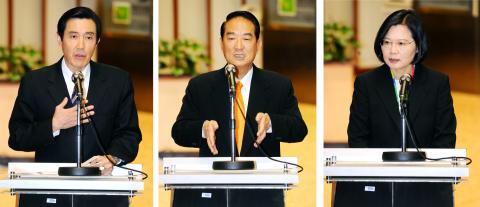The three presidential candidates crossed swords on issues ranging from cross-strait policy, the economy and administrative competency in the second of three televised platform presentation forums last night.
President Ma Ying-jeou (馬英九) of the Chinese Nationalist Party (KMT) chose “rectitude” as his theme, stressing that people’s trust was the most valuable government asset and corruption was the strongest corrosive of such an asset.
Ma asked why the Democratic Progressive Party (DPP) presidential candidate Tsai Ing-wen’s (蔡英文) proposed “10-year policy” did not contain the word “rectitude.”

Photo: Taipei Times
“Is it because rectitude is not important for Taiwan’s future, or because rectitude is, for Tsai and the DPP, a hot coal they dare not touch?” Ma asked.
Ma said the biggest difference between him and Tsai was that he met doubt and questions with clear explanations, but Tsai continued to avoid burning issues.
Tsai said that in the past four years the image of Ma in the eyes of the people had become that of a president that did not empathize with the people, and did not listen to others.
“What we carry with us is people’s expectations, not our own image,” Tsai said, alluding to her criticism of Ma that the latter only cares about his image and not the people’s problems.
Addressing the so-called “1992 consensus” issue, Tsai said that while Ma insisted on the existence of the consensus, he was also terrorizing the people of Taiwan by saying that if they did not accept the consensus all would be lost.
“Why can you not tell the people, President Ma, what price Taiwan has paid for accepting the ‘1992 consensus?’” she asked.
Tsai said she had faith in her proposed “Taiwan consensus” because it would follow a democratic procedure and would accept many opinions, which would dissolve the differences in Taiwan.
Refering to the allegation that the Ma administration has used investigation and intelligence agencies to monitor her campaign, Tsai asked Ma whether he “dare to ask the Bureau of Investigation to bring out the original documents.”
Ma stressed he has not issued a directive to monitor her nor has he received information from investigation and intelligence agencies on any surveillance of the opposition camps’ campaigns.
James Soong (宋楚瑜) of the People First Party referred to how his post-presentation news conference after the first forum was omitted by the state-run Chinese Television System (CTS), saying the attitude shown by the CTS and the Central Election Commission in handling the oversight was “typical bureaucratism.”
“It is this kind of bureaucratic attitude that makes the people want change, want to see what somebody else would do,” he said.
Pointing to the labels “corrupt” for the former DPP Chen Shui-bian (陳水扁) government and “incompetent” for the current Ma administration, Soong said that nobody ever heard of the provincial team serving under him being corrupt or incompetent.
“Voters should not vote for corruption or incompetence, but for my team, which is capable of delivering on their promises,” he added.

SECURITY: As China is ‘reshaping’ Hong Kong’s population, Taiwan must raise the eligibility threshold for applications from Hong Kongers, Chiu Chui-cheng said When Hong Kong and Macau citizens apply for residency in Taiwan, it would be under a new category that includes a “national security observation period,” Mainland Affairs Council (MAC) Minister Chiu Chui-cheng (邱垂正) said yesterday. President William Lai (賴清德) on March 13 announced 17 strategies to counter China’s aggression toward Taiwan, including incorporating national security considerations into the review process for residency applications from Hong Kong and Macau citizens. The situation in Hong Kong is constantly changing, Chiu said to media yesterday on the sidelines of the Taipei Technology Run hosted by the Taipei Neihu Technology Park Development Association. With

CARROT AND STICK: While unrelenting in its military threats, China attracted nearly 40,000 Taiwanese to over 400 business events last year Nearly 40,000 Taiwanese last year joined industry events in China, such as conferences and trade fairs, supported by the Chinese government, a study showed yesterday, as Beijing ramps up a charm offensive toward Taipei alongside military pressure. China has long taken a carrot-and-stick approach to Taiwan, threatening it with the prospect of military action while reaching out to those it believes are amenable to Beijing’s point of view. Taiwanese security officials are wary of what they see as Beijing’s influence campaigns to sway public opinion after Taipei and Beijing gradually resumed travel links halted by the COVID-19 pandemic, but the scale of

A US Marine Corps regiment equipped with Naval Strike Missiles (NSM) is set to participate in the upcoming Balikatan 25 exercise in the Luzon Strait, marking the system’s first-ever deployment in the Philippines. US and Philippine officials have separately confirmed that the Navy Marine Expeditionary Ship Interdiction System (NMESIS) — the mobile launch platform for the Naval Strike Missile — would take part in the joint exercise. The missiles are being deployed to “a strategic first island chain chokepoint” in the waters between Taiwan proper and the Philippines, US-based Naval News reported. “The Luzon Strait and Bashi Channel represent a critical access

Pope Francis is be laid to rest on Saturday after lying in state for three days in St Peter’s Basilica, where the faithful are expected to flock to pay their respects to history’s first Latin American pontiff. The cardinals met yesterday in the Vatican’s synod hall to chart the next steps before a conclave begins to choose Francis’ successor, as condolences poured in from around the world. According to current norms, the conclave must begin between May 5 and 10. The cardinals set the funeral for Saturday at 10am in St Peter’s Square, to be celebrated by the dean of the College